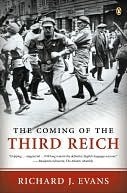More on this book
Community
Kindle Notes & Highlights
Read between
December 13 - December 14, 2023
Communism was the party of the unemployed par excellence.
Despite a widespread contemporary belief to the contrary, therefore, white-collar workers, like manual labourers, were somewhat under-represented among the ranks of Nazi voters in 1930. By contrast, civil servants were over-represented, perhaps reflecting the fact that government cutbacks had put hundreds of thousands of them out of work and reduced the income of many more to the level of a skilled manual labourer or below.
‘We have to work on feelings, souls and emotions so that reason wins the victory.’
The labour movement’s traditional emphasis on education, reason and science was to yield to a new stress on the rousing of mass emotions through street processions, uniformed marches and collective demonstrations of will.
What the elections did make clear, however, was that nearly two-thirds of the voters had lent their support to parties - the Nazis, the Nationalists, and the Communists - who were open enemies of Weimar democracy.
Revolutionary rhetoric and unbridled violence on the streets were not exactly what Papen and Hitler’s other cabinet allies had been expecting when they had agreed to Hitler’s becoming Reich Chancellor two months before, for all their approval of the police crackdown on the left. They had rather expected that bringing the Nazis into government would put a stop to all this.
The ‘Beautification Club’, a well-off association dedicated to improving the town’s parks and woods, put all its funds into building a hunting lodge just beyond the town boundary before dissolving itself. And several of the local guilds, informed that they had to elect new committees by 2 May, arranged huge drinking sessions and lavish banquets in order to use up the funds which, they were convinced, would soon fall into the hands of the Nazis.
Werner Heisenberg, a physicist awarded the Nobel Prize for his development of quantum mechanics, argued that it was important to remain in Germany to keep scientific values intact.
The Nazi vote was above all a protest vote; and, after 1928, Hitler, Goebbels and the Party leadership recognized this implicitly by removing most of their specific policies, in so far as they had any, from the limelight, and concentrating on a vague, emotional appeal that emphasized little more than the Party’s youth and dynamism, its determination to destroy the Weimar Republic, the Communist Party and the Social Democrats, and its belief that only through the unity of all social classes could Germany be reborn.
The Nazi propaganda effort, therefore, mainly won over people who were already inclined to identify with the values the Party claimed to represent, and who simply saw the Nazis as a more effective and more energetic vehicle than the bourgeois parties for putting them into effect.


